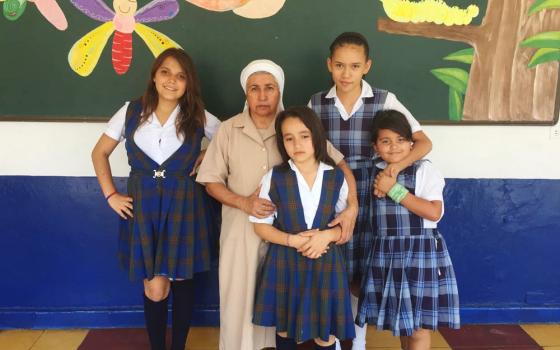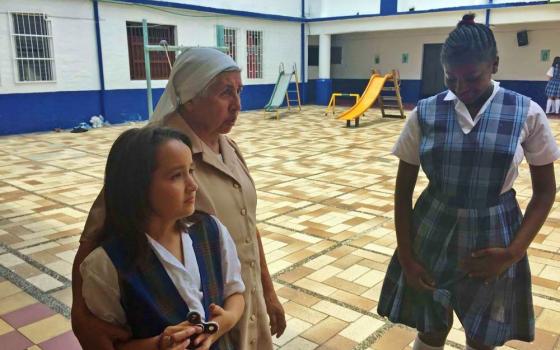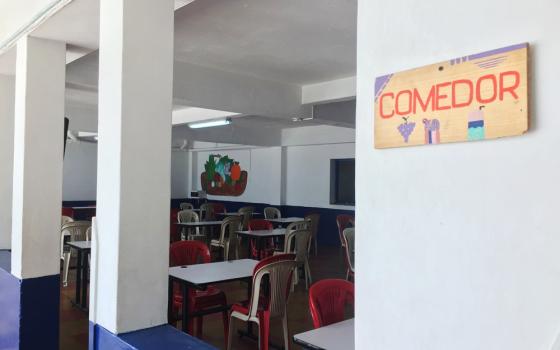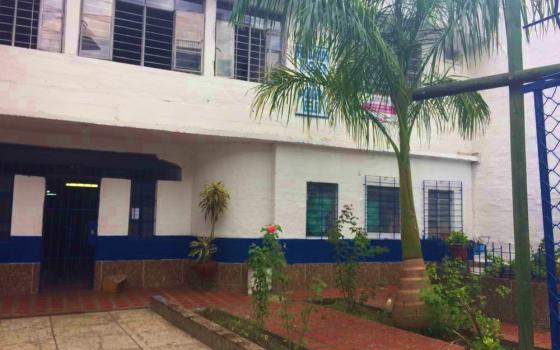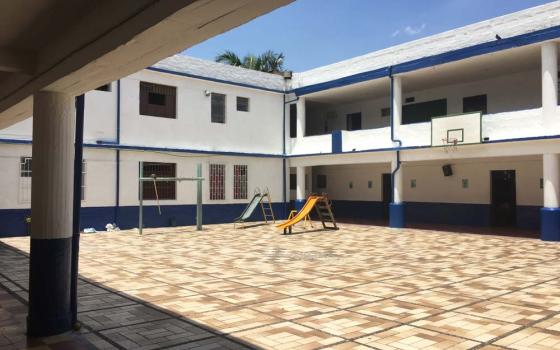When Sr. Sonia Zuleta Ruiz, a Franciscan Missionary Sister of Jesus and Mary, was first assigned to work at an orphanage in Medellín, she was disappointed. Ruiz had visited sisters from her community when they worked at the Hogar Acogida de Belen (Welcoming Home of Bethlehem) and prayed God would never send her there. From the outside, it looked like boring work.
Now, Ruiz is the director of Hogar Acogida de Belen, working alongside a lay staff and another sister to care for the 58 girls who live in the orphanage.
After almost a year working in the Hogar Acogida de Belen, she knows this is where she belongs. The girls who at first turned her off from the prospect of running the orphanage — loud, rowdy, and misbehaved — she now sees as her own.
"If, with God's help and the Most Holy Virgin Mary's help, one can provide these girls with a better quality of life, then one must make the sacrifice," she told Global Sisters Report.
"Even if you don't want to be here, that's your duty."
GSR: What kinds of programs do you coordinate?
Ruiz: The girls' studies, their rides to school, their meals, their behavior — their stay in every sense, as if this were their home. In fact, the name says it — Hogar Acogida de Belen — a home that takes the place of their home, since many times their house is not a home. So they have everything here. They are welcome with love.
Here, they find the warm welcome, the love and the care they don't have in their own houses. They can live and sleep here. They each have a clean bed, daily meals — starting with breakfast, refreshments, lunch, snacks, dinner — and help with homework. It is very important that they get the care and understanding they don't have in their own homes.
Do the girls come from similar backgrounds?
Very few have established families. They have a mom and a dad, but they are poor and can't keep them. Most girls are abandoned or homeless. They come from extreme poverty. In impoverished families, it's possible up to seven people sleep on one mattress, with grandparents, parents and children all piled up, and the girls sleep with the boys. What kind of care is there? They are in real need of being here. Here, they find our love.
How did you come across this job?
A few sisters of my community used to work here. I had come twice to visit, and if you want me to speak frankly, I used to say, "Please, God, don't send me here! This is so boring, I don't want to be here."
I remember one time I was in the chapel [in Palmira, Colombia], and I prayed, "Jesus, I ask that you please not send me to work in Medellín. I don't want to work in a home with the girls over there. They are very rowdy."
One day, the superior came and said, "Sonia, I have a favor to ask of you. I need you to go to Medellín." I froze. "Why, Jesus? I asked you not to send me there!"
What did you tell your superior?
I told her I didn't want to go because I thought the girls would be rowdy, misbehaved, loud. But that all changed. They are not like they used to be. When the chaperones come complaining about the girls, I ask them if they didn't do that themselves when they were kids. All kids do bad things, and if you rewind your tape, you see that you also did that. I rewind my cassette and remember that I used to slide down the handrail when I lived in a house with stairs.
God loves me so much. To tell you the truth, I saw the huge need these girls have. Right now, I'd rather not leave. These girls are in serious need. And I compare these girls with my nieces and see that my nieces, though poor, have their parents' love, their care, their meals.
One girl told me that Saturdays and Sundays they have no food at home, and that sometimes they only have water all day. There's another girl who saves food to share with her dad, who sometimes can't find jobs and doesn't eat. It's very sad. These are girls in need of so much love and care. So now, honestly, I wouldn't like to leave these girls stuck. I'd like to keep working and see them better organized, more responsible.
How do you see the Holy Spirit in your work?
If it wasn't for the Holy Spirit, one wouldn't do anything. The Holy Spirit is the engine: It's what moves you to do what you do. For example, I may suddenly feel I have to go check the basement or go upstairs to the dorm and do a round there, and once I'm in the dorm, I find a girl who is burning with high fever. Who took me over there? The Holy Spirit said, "Go to the dorms; there's a girl in need of your help right now." What would be of us without the help of the Holy Spirit? He is the engine, the one who moves us to do everything the right way. The Spirit is the one who took care of my sadness when I got here and didn't know what I'd do.
We have to be very close to Jesus, the Holy Spirit, and the Most Holy Virgin Mary. They are the ones that move us to do the right thing.
[Soli Salgado is a staff writer for Global Sisters Report. Her email address is [email protected]. Follow her on Twitter @solisalgado.]
